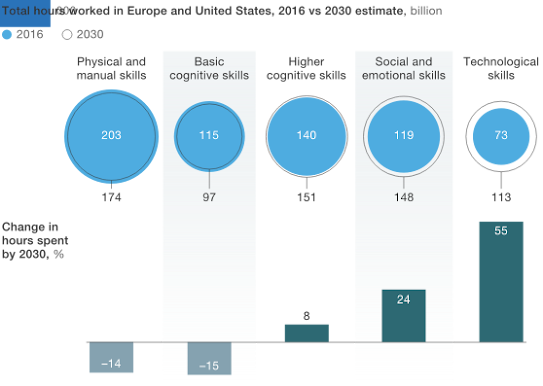Getting the degree while working full-time
Technology advances at a rate that exceeds our ability to keep up with it; today's technology may be obsolete tomorrow. It's difficult to predict how the world will change as we grow older; as a result, many individuals, including me, have been concerned about future employment. Many current jobs will perish or evolve as digitalisation progresses. According to a report by McKinsey, the demand for deeper technical and programming knowledge will increase as much as 55% by the year 2030. As a Turku University of Applied Science (TUAS) student, I will discuss my own and peers' perspectives.
Automation and artificial intelligence will accelerate the shift in skills that the workforce needs.
Illustration 1: Skill shift: Automation and the future of the workforce (McKinsey Global Institute, 2018).
Using my study time efficiently at TUAS, I improved many digital skills. Although my studies were mostly oriented toward digital marketing, I still was able to study other various courses and structure my education to meet my specific objectives (e.g., programming, web development, and data analytics). Most of my school colleagues come from different backgrounds with different skill sets. Still, with the supervision of a teacher, everyone can access a melting pot of unique skills to complete various assignments. Other people's help is insufficient to finish studies on time since pupils must organise and manage their studies. So, what are the alternatives?
Illustration 2: A focused man with a laptop and a kid lying on the bed (Photo by Ketut Subiyanto).
A work overload may be avoided by dedicating a specific amount of time and working on it every day. For example, every day, I set out at least 3 hours for studying, excluding meetings and online classes, which occur once or twice a week. With so many duties, how difficult could it be? How can we maintain our motivation? Not having to start from the beginning, since most of us have some abilities from past work experience or education, could be used as an advantage in accomplishing various activities independently. According to psychologist Brent Small, head of the University of South Florida's School of Ageing Studies, standard cognitive tests are more likely to be performed better by older people who are actively engaged in intellectually engaging activities. Several studies have shown similar results, suggesting that older people can do a wide range of tasks significantly more effectively than previously thought.
Illustration 3: Get a better opportunity to have a secure job.
Staying on top of the latest trends, you’ll need to keep learning. Every day I try to learn something new about my field. Sometimes old problems should have a unique solution just so that I can increase my understanding of the problem. As my colleagues’ and mine examples show, you can get what you need and not fear your future employment. Will your job still be there in the next ten years? Click >>here<< to discover more about my degree.


